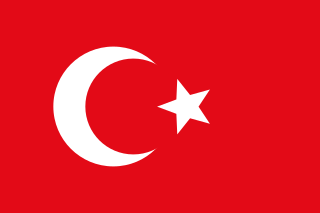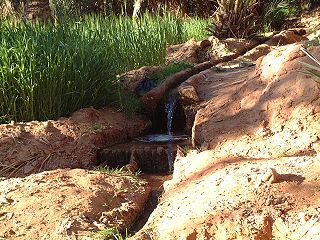External links
- Economic System of Islam Archived 2006-03-28 at the Wayback Machine
| | This article about an Islamic studies book is a stub. You can help Wikipedia by expanding it. |
Economic System of Islam is a book written by Sayyid Abul Ala Maududi, noted for his rejection of capitalism as un-Islamic.

The Ottoman Empire, historically and colloquially known as the Turkish Empire, was an imperial realm that spanned much of Southeast Europe, West Asia, and North Africa from the 14th to early 20th centuries; it also controlled parts of southeastern Central Europe between the early 16th and early 18th centuries.
Sharia is a body of religious law that forms a part of the Islamic tradition based on scriptures of Islam, particularly the Quran and hadith. In Arabic, the term sharīʿah refers to God's immutable divine law and this referencing is contrasted with fiqh, which refers to its interpretations by Islamic scholars. Fiqh, practical application side of sharia in a sense, was elaborated over the centuries by legal opinions issued by qualified jurists and sharia has never been the sole valid legal system in Islam historically; it has always been used alongside customary law from the beginning, and applied in courts by ruler-appointed judges, integrated with various economic, criminal and administrative laws issued by Muslim rulers.

Zakāh is a form of almsgiving, often collected by the Muslim Ummah. It is considered in Islam as a religious obligation, and by Quranic ranking, is next after prayer (salat) in importance. Eight heads of zakat are mentioned in the Quran.
Islamic economics refers to the knowledge of economics or economic activities and processes in terms of Islamic principles and teachings. Islam has a set of special moral norms and values about individual and social economic behavior. Therefore, it has its own economic system, which is based on its philosophical views and is compatible with the Islamic organization of other aspects of human behavior: social and political systems.

Muhammad Taqi al-Din bin Ibrahim bin Mustafa bin Isma'il bin Yusuf al-Nabhani was a Palestinian Islamic scholar who founded the pan-Islamist and fundamentalist organization Hizb ut-Tahrir.
Some economic historians use the term merchant capitalism, a term coined by the German sociologist and economist Werner Sombart in his "The Genesis of Modern Capitalism" in 1902, to refer to the earliest phase in the development of capitalism as an economic and social system. However, others argue that mercantilism, which has flourished widely in the world without the emergence of systems like modern capitalism, is not actually capitalist as such.
The Young Egypt Party is an Egyptian political party.

The caste system in India is the paradigmatic ethnographic instance of social classification based on castes. It has its origins in ancient India, and was transformed by various ruling elites in medieval, early-modern, and modern India, especially in the aftermath of the collapse of the Mughal Empire and the establishment of the British Raj. It is today the basis of affirmative action programmes in India as enforced through its constitution. The caste system consists of two different concepts, varna and jati, which may be regarded as different levels of analysis of this system.
Between the 9th and 14th centuries, the Muslim world developed many advanced economic concepts, techniques and usages. These ranged from areas of production, investment, finance, economic development, taxation, property use such as Hawala: an early informal value transfer system, Islamic trusts, known as waqf, systems of contract relied upon by merchants, a widely circulated common currency, cheques, promissory notes, early contracts, bills of exchange, and forms of commercial partnership such as mufawada.

Abul A'la al-Maududi was an Islamic scholar, Islamist ideologue, Muslim philosopher, jurist, historian, journalist, activist, and scholar active in British India and later, following the partition, in Pakistan. Described by Wilfred Cantwell Smith as "the most systematic thinker of modern Islam", his numerous works, which "covered a range of disciplines such as Qur'anic exegesis, hadith, law, philosophy, and history", were written in Urdu, but then translated into English, Arabic, Hindi, Bengali, Telugu, Tamil, Kannada, Burmese, Malayalam and many other languages. He sought to revive Islam, and to propagate what he understood to be "true Islam". He believed that Islam was essential for politics and that it was necessary to institute sharia and preserve Islamic culture similarly as to that during the reign of the Rashidun Caliphs and abandon immorality, from what he viewed as the evils of secularism, nationalism and socialism, which he understood to be the influence of Western imperialism.
An economic ideology is a set of views forming the basis of an ideology on how the economy should run. It differentiates itself from economic theory in being normative rather than just explanatory in its approach, whereas the aim of economic theories is to create accurate explanatory models to describe how an economy currently functions. However, the two are closely interrelated, as underlying economic ideology influences the methodology and theory employed in analysis. The diverse ideology and methodology of the 74 Nobel laureates in economics speaks to such interrelation.

The Arab Agricultural Revolution was the transformation in agriculture in the Old World during the Islamic Golden Age. The agronomic literature of the time, with major books by Ibn Bassal and Abū l-Khayr al-Ishbīlī, demonstrates the extensive diffusion of useful plants to Medieval Spain (al-Andalus), and the growth in Islamic scientific knowledge of agriculture and horticulture. Medieval Arab historians and geographers described al-Andalus as a fertile and prosperous region with abundant water, full of fruit from trees such as the olive and pomegranate. Archaeological evidence demonstrates improvements in animal husbandry and in irrigation such as with the saqiyah waterwheel. These changes made agriculture far more productive, supporting population growth, urbanisation, and increased stratification of society.

Shush is a city in the Central District of Shush County, Khuzestan province, Iran, serving as capital of both the county and the district. Shush is beside ancient Susa.

The Mughal Empire was an early modern Indo-Muslim empire in South Asia. At its peak, the empire stretched from the outer fringes of the Indus River Basin in the west, northern Afghanistan in the northwest, and Kashmir in the north, to the highlands of present-day Assam and Bangladesh in the east, and the uplands of the Deccan Plateau in South India.
Islamic capitalism was active during the Islamic Golden Age and Arab Agricultural Revolution, where an early market economy and form of merchant capitalism took root between the 8th–12th centuries. A vigorous monetary economy was based on a widely-circulated currency and the integration of monetary areas that were previously independent. Business techniques and forms of business organisation employed during this time included contracts, bills of exchange, long-distance international trade, forms of partnership (mufawadha) such as limited partnerships (mudharaba), and forms of credit, debt, profit, loss, capital (al-mal), capital accumulation, circulating capital, capital expenditure, revenue, cheques, promissory notes, trusts, savings accounts, transactional accounts, pawning, loaning, exchange rates, bankers, money changers, ledgers, deposits, assignments, the double-entry bookkeeping system, and lawsuits. Organizational enterprises independent from the state also existed in the medieval Islamic world, while the agency institution was also introduced. Many of these early capitalist concepts were adopted and further advanced in medieval Europe from the 13th century onwards. Some have argued that these economic activities laid the foundations for the development of modern capitalism.
The Free Republican Party or Al-Hizb al-Gomhory al-Ahrar is a political party in Egypt. The Free Republican Party might be considered as a liberal party.
Haraç was a land tax levied on non-Muslim subjects in the Ottoman Empire.

The economic policies proposed under the banner of "Islamisation" in Pakistan include executive decrees on Zakāt (poor-due), Ushr (tithe), judicial changes that helped to halt land redistribution to the poor, and perhaps most importantly, elimination of riba. Perhaps the foremost exponent of Islamisation among Pakistan's rulers—General Muhammad Zia-ul-Haq—advanced a programme in 1978 to bring Pakistan law in line with the principles of Sharia law.

Anti-imperialism in political science and international relations is opposition to imperialism or neocolonialism. Anti-imperialist sentiment typically manifests as a political principle in independence struggles against intervention or influence from a global superpower, as well as in opposition to colonial rule. Anti-imperialism can also arise from a specific economic theory, such as in the Leninist interpretation of imperialism, which is derived from Lenin's 1917 work Imperialism, the Highest Stage of Capitalism. People who categorize themselves as anti-imperialists often state that they are opposed to colonialism, colonial empires, hegemony, imperialism and the territorial expansion of a country beyond its established borders.

Khamenei's 8-Article command to the chiefs of branches is considered as a historical headline in Iran in regards to "fighting economic corruption in the country"; which was issued on 30 April 2001 by the command of Iran's supreme leader, Ali Khamenei. At the mentioned day, Iran's supreme leader issued an eight-article charter, that, afterwards it became known by the mentioned name, i.e. "the charter of combat against economic corruptions".